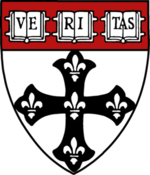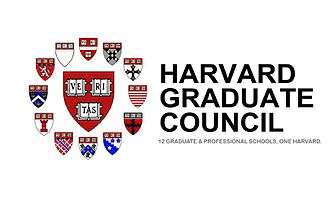Harvard T.H. Chan School of Public Health
The Harvard T.H. Chan School of Public Health is the public health school of Harvard University, located in the Longwood Medical Area of Boston, Massachusetts. The school grew out of the Harvard-MIT School for Health Officers,[4][5][6][7][8] the nation's first graduate training program in population health, which was founded in 1913 and then became the Harvard School of Public Health in 1922. Michelle Ann Williams became the school's dean in 2016 following the departure of former dean Julio Frenk.[9] She is the first African American to head a Harvard faculty.[10]
 Coat of arms | |
Former name | Harvard School of Public Health |
|---|---|
| Type | Private |
| Established | 1913 |
Parent institution | Harvard University |
| Dean | Michelle Ann Williams |
Academic staff | 465[1] |
| Students | 984[1] |
| 422[2] | |
| Alumni | 13,484+[3] |
| Location | , , United States |
| Website | hsph |

Considered a preeminent school of public health in the United States, Chan is ranked as the 2nd best public health school in the nation by U.S. News & World Report.[11]
History
The School traces its origins to the Harvard-MIT School for Health Officers, founded in 1913; Harvard calls it "the nation's first graduate training program in public health." In 1922, the School for Health Officers became the Harvard School of Public Health. In 1946, it was split off from the medical school and became a separate Harvard faculty.[12] It was renamed the Harvard T.H. Chan School of Public Health in 2014 in honor of a $350 million donation, the largest in Harvard's history at the time, from the Morningside Foundation,[13] run by Harvard School of Public Health alumnus Gerald Chan, SM '75, SD '79, and Ronnie Chan, the sons of T.H. Chan.[14][15]
Curriculum
The Master of Public Health program offers nine fields of study:
- Clinical Effectiveness (CLE)
- Epidemiology (EPI)
- Global Health (GH)
- Health and Social Behavior (HSB)
- Health Management (HM)
- Health Policy (HP)
- Occupational and Environmental Health (OEH)
- Quantitative Methods (QM)
- Nutrition (NUT)[16]

Degree programs offered by specific departments:
- Biostatistics: SM, PhD
- Environmental Health (EH): SM, PhD, DrPH
- Epidemiology (EPI): SM, DrPH
- Genetics and Complex Diseases: PhD
- Health Policy and Management: SM, PhD
- Health Care Management: SM
- Immunology and Infectious Diseases: PhD
- Nutrition (NUT): DrPH, PhD
- Global Health and Population (GHP): PhD
- Social and Behavioral Sciences (SBS): SM, DrPH
- Population Health Sciences (Interdisciplinary PhD within departments of EH, EPI, GHP, NUT, and SBS)
The Harvard Doctor of Public Health (DrPH) was launched in 2014 as a multidisciplinary degree providing advanced education in public health along with mastery of skills in management, leadership, communications, and innovation thinking. The program is a cohort-based program emphasizing small-group learning and collaboration. The program is designed for three years – two years at Harvard, plus one year in a field-based doctoral project – although some students may take up to four years to complete the program. Academic training in the DrPH covers the biological, social, and economic foundations of public health, as well as essential statistical, quantitative, and methodological skills in the first year, an individualized course of study in your second year, and a field-based, capstone project called the DELTA (Doctoral Engagement in Leadership and Translation for Action) in the final year(s) of the program.[17]
PhD programs are offered under the aegis of the Harvard Graduate School of Arts and Sciences.
Research projects
- The Nurses' Health Study and Nurses' Health Study II, which have followed the health of over 100,000 nurses from 1976 to the present; its results have been used in hundreds of published papers.[18]
- The Health Professionals Follow-up Study, a similar study of over fifty thousand male health professionals seeking to connect diet, exercise, smoking, and medications taken to frequency of cancer and cardiovascular disease.[19]
- The International Health Systems Program, which has provided training or technical assistance to projects in 21 countries and conducts health policy research.[20]
- The Program in Health Care Financing, which studies the economics of national health care programs; evaluates the health care programs of China, Hong Kong, Taiwan, and other countries; studies the effects of bringing HMO-like hospital reimbursement practices to developing countries; and applies hedonimetrics to health care.[21]
- The Program on Humanitarian Policy and Conflict Research (HPCR),[22] which studies public health and humanitarian law and policy in the context of conflict-torn regions like the Gaza Strip and transnational issues like terrorism.[23]
- The Lung Cancer S.O.S. study, examining the risk factors for and prognosis of lung cancer in terms of genetics and environment.[24]
- The College Alcohol Study, which examines the causes of college binge drinking and approaches to prevention and harm reduction.[25]
- The Program on the Global Demography of Aging, which studies policy issues related to economics of aging with a focus on the developing world.[26]
- The Superfund Basic Research Program (see Superfund), studying toxic waste management.[27]
- The Lee Kum Sheung Center for Health and Happiness, to "help identify how positive aspects of living can lead to better health and a longer life"[28] and "coordinate research across many disciplines at Harvard University" and "understanding the complex interplay between positive psychological well-being and human health."[29][30][31][32][33][34]
Notable faculty (and past faculty)
- Katherine Baicker, economist, a former member of the Council of Economic Advisers
- Robert Blendon, political strategy of health and public opinion expert
- Barry Bloom, immunologist and former dean
- David Bloom, economist
- David Canning, economist
- Francesca Dominici senior associate dean for research, professor of biostatistics, data scientist, and air pollution expert
- Arnold Epstein, department chair for health policy and management
- Max Essex, HIV researcher
- Julio Frenk, former dean of school of public health and former Secretary of Health of Mexico
- Atul Gawande, general and endocrine surgeon
- Sue Goldie, physician and decision scientist, MacArthur fellowship recipient
- John Graham, policy and decision scientist, former director of the Office of Information and Regulatory Affairs
- Laurie Glimcher, immunologist
- Alice Hamilton, occupational health and toxicology; first woman appointed to the faculty of Harvard University[35]
- David Hemenway, economist and injury prevention expert
- William Hsiao, economist
- Frank Hu, epidemiologist and nutrition researcher
- David Hunter, epidemiologist, Acting Dean of the Faculty and former Dean for Academic Affairs at School of Public Health
- Curtis Huttenhower, computational biologist
- Ichiro Kawachi, social epidemiologist
- Howard Koh, public health researcher, the 14th Assistant Secretary for Health at the U.S. Department of Health and Human Services.
- Nan Laird, biostatistician, former head of department
- Alexander H. Leighton, psychiatric epidemiologist
- Richard Levins, ecologist and mathematical biologist
- Xihong Lin, biostatistician and mathematician, 2006 COPPS presidents' award recipient
- Jun S. Liu, biostatistician and mathematician, 2002 COPPS presidents' award recipient
- Bernard Lown, co-founded the Nobel Prize-winning group Physicians for Social Responsibility; founder of the Lown Cardiovascular Research Foundation
- Adetokunbo Lucas, former director of Tropical Diseases Research at the World Health Organization (WHO)
- Brian MacMahon, cancer epidemiologist
- Sezan Mahmud, Writer and university professor
- Christopher Murray, physician and health economist
- Joseph Newhouse, economist and director of the RAND Health Insurance Experiment
- Shuji Ogino, pioneer in molecular pathological epidemiology
- Eric Rubin, editor-in-chief of New England Journal of Medicine
- James Robins, epidemiologist and biostatistician
- Pardis Sabeti, computational biologist, medical geneticist and evolutionary geneticist
- Amartya Sen, economist, Nobel laureate in Economics
- Gita Sen, feminist scholar and specialist in international population policy
- Andrew Spielman, public health entomologist
- Frederick J. Stare, controversial chair of Nutrition Institute
- James H. Ware, biostatistician
- Thomas Huckle Weller, Nobel laureate in Physiology and Medicine
- George C. Whipple, cofounder of School in 1922[36]
- Walter Willett, physician and nutrition researcher
Notable alumni
- Anthony Irvine Adams, 2001 Alumni Award of Merit for a distinguished service in public health practice
- James B. Aguayo-Martel, pioneer in ophthalmology
- Gro Harlem Brundtland, former Prime Minister of Norway, former Director-General of the World Health Organization
- Eli Capilouto, twelfth president of the University of Kentucky
- William Foege, MPH 1965, physician, former Director of the Centers for Disease Control and Prevention
- Mandy Cohen, physician, Secretary of the North Carolina Department of Health and Human Services
- Humayun Chaudhry, President and CEO of the Federation of State Medical Boards
- Winston Dang, head of Taiwan's Environmental Protection Administration from 2004 to 2008[37]
- Jonathan Fielding, Director Los Angeles County Department of Public Health, editor Annual Review of Public Health
- Janina R. Galler, PI and Director of 45+-year Barbados Nutrition Study in the Lesser Antilles, in the Americas, a longitudinal study showING the intergenerational legacy of poverty and disadvantage that result from childhood malnutrition.
- Steven K. Galson, former Acting Surgeon General of the United States
- Atul Gawande, surgical safety pioneer, MacArthur Fellow, Rhodes Scholar
- Sue Goldie, MacArthur Fellow and decision scientist
- Timothy Johnson, chief medical correspondent for ABC News
- Karl Lauterbach, German politician (SPD)
- John S. Marr, MD, MPH, epidemiologist and author.
- Jonathan Mann, former head of the World Health Organization global HIV/AIDS program
- James O. Mason, former Acting Surgeon General of the United States, former Director of the Centers for Disease Control and Prevention
- Shuji Ogino, pioneer in molecular pathological epidemiology
- Endang Rahayu Sedyaningsih, former Minister of Health of Indonesia
- David J. Sencer, longest-serving Director of the Centers for Disease Control and Prevention[38]
See also
References
- "Key Facts". About. Harvard T. H. Chan School of Public Health. Retrieved 26 January 2020.
- "Enrollment and Degrees". About. Harvard T. H. Chan School of Public Health. Retrieved 26 January 2020.
- "Alumni". About. Harvard T. H. Chan School of Public Health. Retrieved 26 January 2020.
- "Harvard School of Public Health celebrates 100 years of global health leadership". harvard.edu. 28 August 2013. Retrieved 1 April 2018.
- "Centennial". Centennial. Retrieved 1 April 2018.
- "History, from About HSPH, reprinted online from HCSPH Fast Facts booklet, accessed 1/19/2016" (PDF). harvard.edu. Retrieved 1 April 2018.
- "Who We Are". Admissions. May 15, 2015. Retrieved Feb 4, 2019.
- [Who We Are, from HCSPH Admissions website, accessed 1/19/2016]
- "Michelle Williams to lead Harvard Chan School". harvard.edu. 19 February 2016. Retrieved 1 April 2018.
- "Michelle A. Williams to Lead School of Public Health As First Black Harvard Faculty Dean - News - The Harvard Crimson". thecrimson.com. Retrieved 1 April 2018.
- 2015 Ranking of Best schools of Public Health in US by U.S. News & World Report.
- "HSPH Catalog - Harvard School of Public Health". harvard.edu. Retrieved 1 April 2018.
- "Boston Orange 波士頓菊子: 晨興基金捐三億五 哈佛公衛學院冠名陳曾熙". bostonorange.blogspot.com. 9 September 2014. Retrieved 1 April 2018.
- "The story of T. H. Chan". harvard.edu. 19 July 2016. Retrieved 1 April 2018.
- "Hang Lung's Gerald Chan to Give $350M to Harvard". mingtiandi.com. 9 September 2014. Retrieved 1 April 2018.
- "Master of Public Health". Harvard T. H. Chan School of Public Health. Harvard University. Retrieved 26 January 2020.
- "Doctor of Public Health". Doctor of Public Health. Harvard T. H. Chan School of Public Health. September 28, 2016. Retrieved September 28, 2016.
- "Nurses' Health Study -". www.channing.harvard.edu. Retrieved 1 April 2018.
- "Health Professionals Follow-Up Study". Health Professionals Follow-Up Study. Retrieved 1 April 2018.
- "International Health Systems Program at Harvard". harvard.edu. Retrieved 1 April 2018.
- "Program in Health Care Financing". Program in Health Care Financing. Retrieved 1 April 2018.
- "Program on Humanitarian Policy and Conflict Research". 21 May 2010. Archived from the original on 21 May 2010.
- Program on Humanitarian Policy and Conflict Research (HPCR) Archived 2010-05-21 at the Wayback Machine
- "Lung Cancer Study (LCS)". harvard.edu. 14 October 2012. Retrieved 1 April 2018.
- "College Alcohol Study". www.hsph.harvard.edu. Retrieved 1 April 2018.
- "Program on the Global Demography of Aging at Harvard University". Program on the Global Demography of Aging at Harvard University. Retrieved 1 April 2018.
- "The Superfund Basis Research Program at Harvard University". harvard.edu. Retrieved 1 April 2018.
- "Family of Chinese oyster sauce empire gives $21 million to Harvard, Apr 25, 2016, 6:13am EDT". Bizjournals.com. Retrieved 2019-02-04.
- "About the Lee Kum Sheung Center for Health and Happiness - Health and Happiness". 29 April 2016. Archived from the original on 2016-04-29. Retrieved 1 April 2018.
- "$21 Million Gift Launches Center for Health and Happiness - News - The Harvard Crimson". www.thecrimson.com. Retrieved 1 April 2018.
- Hamblin, James. "Harvard Just Launched a Center for Happiness". theatlantic.com. Retrieved 1 April 2018.
- "INTERVIEW: Harvard University explores happiness, health with gifted $21 million. Osler, C. Daily Free Press, Boston University. April 28, 2016". dailyfreepress.com. Retrieved 1 April 2018.
- "A quest for happiness". harvard.edu. 22 April 2016. Retrieved 1 April 2018.
- "Lee Kum Sheung Center for Health and Happiness". harvard.edu. 25 April 2016. Retrieved 1 April 2018.
- "Changing the Face of Medicine | AliceHamilton". Nlm.nih.gov. 2003-10-14. Retrieved 2019-02-04.
- "George Chandler Whipple." (1925). Jour. American Water Works Association. 13:1, 93-4.
- Galford, Hugh S. (August 2007). "The Over-Educated Garbage Man: Minister Winston Dang of Taiwan's Environmental Protection Administration". Washington International. Archived from the original on 2014-03-02. Retrieved 2013-02-13.
- "Magazine Archives". Harvard Public Health Review. Winter 2007. Retrieved 30 September 2009.
External links
![]()
- Official website
- Professor Andrew Speilman, Professor Tropical Public Health, Harvard School of Public Health Freeview Issues programme on Malaria by the Vega Science Trust.
Centers and Institutes
- Jay Winsten Center for Health Communication
- François-Xavier Bagnoud Center for Health and Human Rights
- Harvard Center for Cancer Prevention
- Harvard Center for Population and Development Studies
- Harvard Injury Control Research Center
- Harvard School of Public Health AIDS Initiative (HSPH HAI)
- Cyprus International Institute for Environmental and Public Health
- John B. Little Center for Radiation Sciences